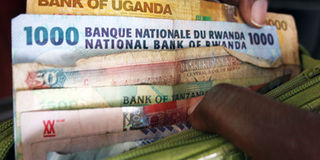EAC gets market for agri-products and finance options

EAX will link small-scale farmers in EAC to agricultural and financial markets so they can get competitive prices for their crops and access funding for their ventures.
What you need to know:
The new investment initiative will boost regional trade by increasing employment, market players and drive agricultural financing.
Ugandan farmers have been challenged to take advantage of the just-launched East African Commodity exchange (EAX).
East Africa Heads of States launched the regional commodity exchange at the Sixth Northern Corridor Integration Projects Summit at Serena Hotel in Kigali on July 3. The EAX is a regional commodity exchange established to link smallholder farmers to agricultural and financial markets, to secure competitive prices for their products, and to facilitate access to financial opportunities.
Its initial target is to facilitate trade across all five East African Community (Uganda, Kenya, Rwanda, Burundi and Tanzania) member states. EAX is owned by Africa Exchange Holdings, Ltd (AFEX). In Rwanda, EAX is owned by local investment company, Ngali Holdings Ltd.
Dr Jendayi Frazer, formerly the US Assistant Secretary of State for African Affairs, is among three principal investors in EAX. “The EAX has the capacity to facilitate cross-border trading of commodities within the EAC, providing a central marketplace, connecting buyers and sellers throughout the region,” Dr Frazer said.
She said for EAX to be true they will open up for regional investors to be part to it.
“EAX will link small-scale farmers in the East African community (EAC) to agricultural and financial markets so they can get competitive pricing for crops and access to finance,” said Dr Frazer in a communication.
EAX supplements the EAC’s goal of regional economic integration, and putting in place a world-class exchange to create a globally competitive market for Africa’s commodities.
It is expected that the new investment initiative will boost regional trade by increasing employment opportunities, accommodate a higher number of market participants and drive agricultural financing.
Uganda reacts
Commenting about this development, the Executive Director, Uganda Commodity Exchange, Ms Deborah Mwesigye, said: “Uganda is a surplus producing country and has the capacity to supply but this will work better when we formulate a national commodity exchange through which we shall be able to trade better at the EAX”.
Following this, Ms Mwesigye called upon farmers to take advantage of this opportunity and produce more commodities, especially beans and maize where the country has been producing surplus.
Mr Caleb Gumisiriza, the Uganda National Farmers Federation Policy Research and Advocacy Manager, said this is a great opportunity for Ugandan farmers to increase their trade. He added: “Through EAX, farmers will minimise on the market chain players who reduce on their profitability. To be able to benefit more from the EAX, he advised farmers to organise themselves into cooperatives or groups to be able buy/sell bulk and attract better buyers.
However, he said, the challenge with Uganda is that there is still little knowledge on how the exchange commodities markets work and thinks that with the presence of EAX, there will be information sharing on how it works and farmers can benefit.
EAX operation
Established by Tony O. Elumelu, CON, of Heirs Holdings, Nicolas Berggruen of Berggruen Holdings, Dr Frazer of 50 Ventures and Rwandan investment company Ngali Holdings, the EAX provides opportunities for faster and more inclusive African economic growth through intra-African trade formally unnoticed on this scale in the region.
In 2013, EAX became the first regional exchange to link smallholder farmers to agricultural and financial markets with competitive pricing. Dr Frazer said: “EAX will use NASDAQ’s OMX X-Stream trading platform for electronic trading and warehouse receipts so farmers can deposit their produce into EAX certified warehouses and access its services.”
Warehouse receipt system
Warehouse receipt acts as a negotiating instrument. It can be traded, sold, swapped, used as collateral to support borrowing, or in some cases even accepted for delivery against a derivative instrument such as a futures contract.
WRS unlocks commercial farming potential, especially for small scale farmers with hardship in accessing credit.
In Uganda WRS was passed by Parliament as an Act, the model promoted by the Uganda Commodity Exchange (UCE) is one where the commodities such as maize, coffee, cotton, or beans which meet East African quality standards are deposited in UCE-licensed warehouses.
Then, the warehouse operators grade the commodity and confirm the quantity and issue a transferable electronic receipt. In order to facilitate the process, warehouses were established countrywide but mainly in Kasese, Jinja, Gulu, Lira, Kapchorwa and Masindi.




